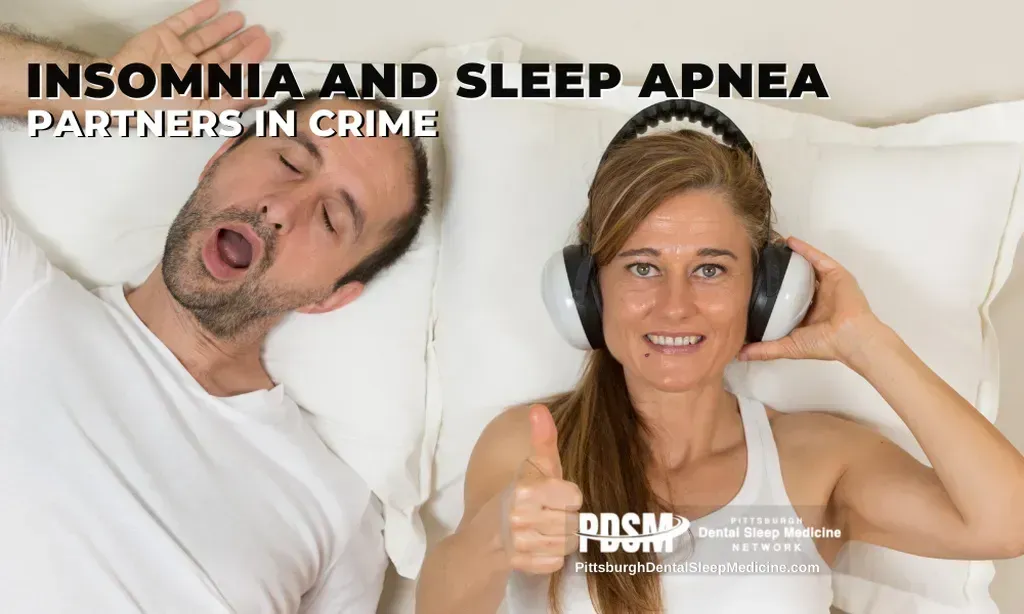Insomnia and Sleep Apnea: Partners in Crime

The importance of quality sleep, defined as deep, restful, and restorative for our bodies, is gaining more and more recognition in the medical community. There is a direct correlation to overall health, well-being, and longevity.
The importance of quality sleep, defined as deep, restful, and restorative for our bodies, is gaining more and more recognition in the medical community. There is a direct correlation to overall health, well-being, and longevity.
We all challenge our mental and physical capacities in our wake time and rely on achieving adequate amounts of deep/"delta" sleep and REM "dreaming" sleep to refuel and rebuild the mind and body in preparing us for each subsequent day. When either or both of these stages of sleep are inadequate or absent we pay the price.
Our performance and production in daily activities in the short and long term gradually suffer. Cognition tends to falter and systems debilitate. We become more prone to illness and disease and may even look more aged than we actually are.
These problems in part are due to reductions in the release of human growth hormone (HGH)-the rebuilding agent- and prolactin, which maintains the immune system. This happens when sleep architecture is abnormal or, in other words, the stages of sleep are not in normal proportion.
The two biggest "partners in crime" robbing us of the quality sleep that we need are insomnia and Obstructive Sleep Apnea (OSA). Insomnia is the most prevalent sleep disorder on the planet. It is described as having difficulty initiating sleep, maintaining sleep, or waking too early despite having adequate opportunity to sleep. The general consensus of many studies estimates that 30% of our adult population suffers from some type of insomnia.
The numerous breathing stoppages during sleep that characterize obstructive sleep apnea essentially disrupt the continuity of deep sleep shortchanging the body of all its benefits. With the ever-increasing prevalence of OSA (24% men and 9% women -- data from the Wisconsin and Sleep Heart Health cohort studies) in our adult US population, it is imperative to note that over 50% of apneics also have some degree of insomnia. In addition, current research indicates that up to two-thirds of all insomniacs have OSA.
So, the challenge for both medical and dental professionals who manage those with insomnia and OSA is to recognize that these conditions commonly coexist. They need to discern the contribution of each condition to their patient's symptoms and develop their treatment approach accordingly.
Some of the factors that must be considered when individuals present with this "double-edged" sword are sleep hygiene, behavioral and lifestyle habits, other medical conditions, medications, and psychosocial situations. In my own experience, I have found that this may require the sleep professional to be part counselor, clinician, and scientist. This may often involve collaboration with other specialties.
Preparing properly for sleep includes eliminating the use of electronics with LED screens and dimming lights in the hours just before bedtime. The lack of light keeps the brain on target for releasing natural melatonin which serves to initiate sleep.
Avoiding alcohol, caffeine, and nicotine in the evening hours, which either stimulate the brain or interfere with achieving deep sleep, maybe in order. Other medical conditions and medications can contribute to insomnia or apnea. Medical conditions associated with chronic pain such as arthritis and fibromyalgia can be managed to be more comfortable during sleep using nutritional supplements and/or herbal remedies rather than conventional medications with sleep-deterrent side effects.
More effective sleep postures and bed positions can encourage better sleep quality for those with OSA, acid reflux, and conditions like congestive heart failure that cause swelling in the lower extremities. Changes can be made to medications for hypertension, depression, and anxiety that have side effects of insomnia, disruption of normal sleep architecture, and relaxing muscles including those supporting nighttime airway patency. Alternatives, modified dosages, and even alterations in the patterns of usage from evening to morning can lessen their negative impact on sleep.
Finally, many insomniacs struggle with personal or work-related circumstances that need to be identified, addressed and practical solutions discussed. It is certainly within the scope of sleep professionals to counsel or refer for appropriate help.
When I first began treating patients with sleep-disordered breathing, I realized soon enough that individuals who suffer from OSA are like puzzles: some simple, but many complex. Those presenting with OSA complicated with insomnia can be solved if the treating clinicians, essential medical colleagues, and afflicted individuals are vested in assessing and managing as much of the puzzle as possible.
Michael F. Hnat DMD, D-ABDSM maintains a private dental practice near Pittsburgh, PA with a primary focus on dental sleep medicine and TMJ disorders.
If you feel that you are suffering from insomnia due to Obstructive Sleep Apnea,
contact Pennsylvania Dental Sleep Medicine for a consultation. (717) 995-3590.

AUTHOR
Michael F. Hnat, DMD, DABDSM, DABCDSM


